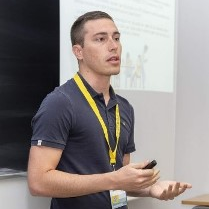Education for Sustainable Development: Commitments and Challenges——Selected Papers from CIEI 2021
A special issue of Sustainability (ISSN 2071-1050). This special issue belongs to the section "Sustainable Education and Approaches".
Deadline for manuscript submissions: closed (30 April 2022) | Viewed by 6338
Special Issue Editors
Interests: education; technology; higher education; learning; methodologies; social justice; social inclusion
Special Issues, Collections and Topics in MDPI journals
Interests: educational guidance; teacher training; social education; educational technology; sustainability education; educational innovation; active methodologies; gamification; digital skills
Special Issues, Collections and Topics in MDPI journals
Interests: mobile learning; educational technology; ICT; teacher training; higher education teaching; pedagogy; online learning; technology enhanced learning; social networks and social applications; internet risks
Special Issues, Collections and Topics in MDPI journals
Interests: curriculum design; teacher and school leaders training; learning assessment; school evaluation; sustainability education; teaching for global competence; educational innovation; active and authentic methodologies
Special Issues, Collections and Topics in MDPI journals
Special Issue Information
Dear Colleagues,
Education for sustainable development aims to offer answers to society by providing the knowledge, competences, values, and attitudes necessary to favour an ethical global development with the environment, the economy and, in this way, to achieve a fairer and more inclusive society.
Education for sustainable development therefore encompasses cognitive, social, emotional, and behavioral dimensions of learning, pedagogy, and learning environments in a holistic and transformative way.
At the global level, four basic objectives are pursued: first of all, to employ interactive pedagogy through active, learner-centred methodologies; secondly, to integrate sustainability issues related to the Sustainable Development Goals; thirdly, to empower people to take responsibility for present and future generations by actively contributing to societal transformation; and finally, to enable the achievement of Sustainable Development Goals towards building a more socially just world.
This Special Issue aims to address the commitments and challenges in the field of education for sustainable development. We believe that this Special Issue is timely for education because of the potential of the topic, as it covers an important area, quality education, highlighted by the SDGs of the UN’s 2020–2030 agenda and the post-pandemic context. Because of this, we expect to receive a significant number of manuscripts. As this is a topic of particular relevance in the field of education, we hope that this Special Issue will set a precedent and serve as a reference on the topic of today’s sustainable education challenges.
Conference Name: XV Congresso Internazionale sull’educazione e l’innovazione (CIEI2021)
Date: 13–15 December 2021
Location: Firenze, Italy
Conference Organizer: University of Firenze and University of Granada
Prof. Dr. Antonio-Manuel Rodríguez-García
Prof. Dr. José Antonio Marín-Marín
Prof. Dr. José-María Romero-Rodríguez
Prof. Dr. Davide Capperucci
Guest Editors
Manuscript Submission Information
Manuscripts should be submitted online at www.mdpi.com by registering and logging in to this website. Once you are registered, click here to go to the submission form. Manuscripts can be submitted until the deadline. All submissions that pass pre-check are peer-reviewed. Accepted papers will be published continuously in the journal (as soon as accepted) and will be listed together on the special issue website. Research articles, review articles as well as short communications are invited. For planned papers, a title and short abstract (about 100 words) can be sent to the Editorial Office for announcement on this website.
Submitted manuscripts should not have been published previously, nor be under consideration for publication elsewhere (except conference proceedings papers). All manuscripts are thoroughly refereed through a single-blind peer-review process. A guide for authors and other relevant information for submission of manuscripts is available on the Instructions for Authors page. Sustainability is an international peer-reviewed open access semimonthly journal published by MDPI.
Please visit the Instructions for Authors page before submitting a manuscript. The Article Processing Charge (APC) for publication in this open access journal is 2400 CHF (Swiss Francs). Submitted papers should be well formatted and use good English. Authors may use MDPI's English editing service prior to publication or during author revisions.
Keywords
- teacher training
- education for sustainable development
- education for global development
- sustainability education
- pedagogy of sustainability
- sustainable goals
- educational technology
- inclusive education
- educational methodologies
- quality education
- Agenda 2030
- education challenges
- COVID-19








